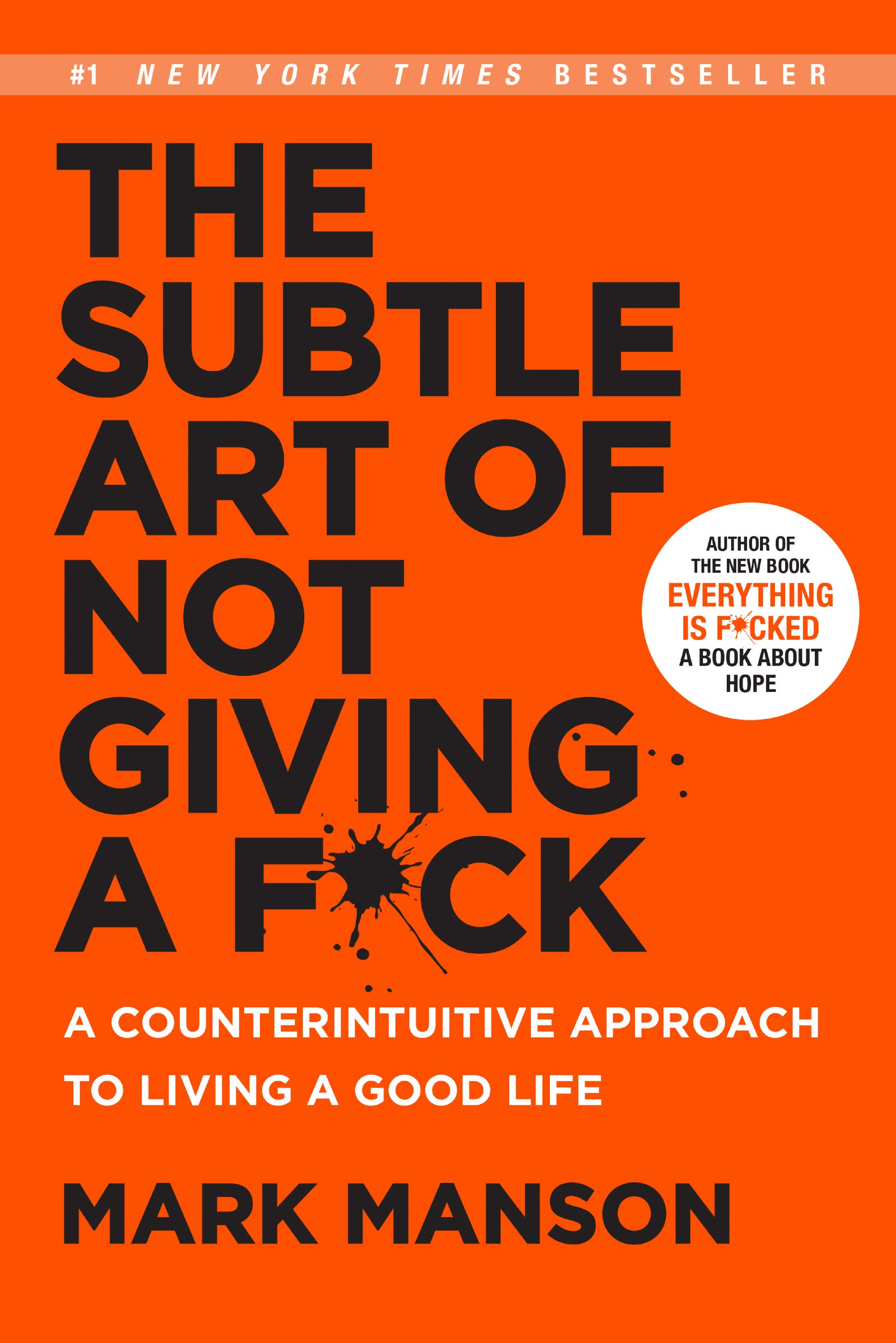
The Subtle Art of Not Giving a F*ck
Mark Manson
 GENRE: Personal Development
GENRE: Personal Development
 PAGES: 224
PAGES: 224
 COMPLETED: January 26, 2022
COMPLETED: January 26, 2022
 RATING:
RATING: 




Short Summary
There are only so many things we can give a f**k about and we need to figure out which ones really matter. Mark Manson helps readers do just that by explaining why we have a tendency to care too much and why we sometimes care about the wrong things entirely. In The Subtle Art, Manson helps readers direct their f**ks to the things that are actually important.
Key Takeaways



Favorite Quote
"As a rule, people who are terrified of what others think about them are actually terrified of all the shitty things they think about themselves being reflected back at them."
Book Notes 📑
Ch. 1: Don't Try
- Most of us struggle throughout our lives with giving too many fucks in situations where fucks do not deserve to be given.
- Quote (P. 5): “The key to a good life is not giving a fuck about more; it’s giving a fuck about less, giving a fuck about only what is true and immediate and important.”
- Focus on the truly important things in life. The opinions of other people, for example, are not worth giving a fuck about.
- Self-love is key to not caring what others think. When you love yourself, you unlock so much freedom to do and say what you want without valuing yourself based on what others think of you. You are centered by the love you have for yourself.
- The Four Agreements
- The Backwards Law — Philosopher Alan Watts coined this. It’s the idea that the more you pursue feeling better all the time, the less satisfied you become, as pursuing something only reinforces the fact that you lack it in the first place.
- Quote (P. 8): “By not giving a fuck that you feel bad, you short-circuit your Feedback Loop from Hell; you say to yourself, ‘I feel like shit, but who gives a fuck?’ And then, as if sprinkled by magic fuck-giving fairy dust, you stop hating yourself for feeling so bad.”
- This attitude of acceptance prevents you from continuously beating yourself up for things going on in your life.
- Quote (P. 7): “Back in Grandpa’s day, he would feel like shit and think to himself, ‘Gee whiz, I sure do feel like cow turd today. But hey, I guess that’s just fine. Back to shoveling hay.’”
- The problem in today’s world is, because of all the ways we can now see or know things, there’s an infinite number of ways we can discover that we aren’t good enough and things aren’t as great as they could be.
- In the end, the world is fucked and always has been. Acceptance is the key.
- Quote (P. 9): “The desire for a more positive experience is itself a negative experience. And, paradoxically, the acceptance of one’s negative experience is itself a positive experience.”
- Accept the situation. Accept what is. You can still strive to be better, but focus on accepting.
- Pursuing the negative generates the positive.
- Ex. The pain you pursue in the gym produces health.
- Ex. Suffering through fears and anxieties is what allows you to build courage and perseverance.
- Avoiding the negative only backfires.
- Quote (P. 11): “To try to avoid pain is to give too many fucks about pain. In contrast, if you’re able to not give a fuck about the pain, you become unstoppable.”
- Quote (P. 12): “To not give a fuck is to stare down life’s most terrifying and difficult challenges and still take action.”
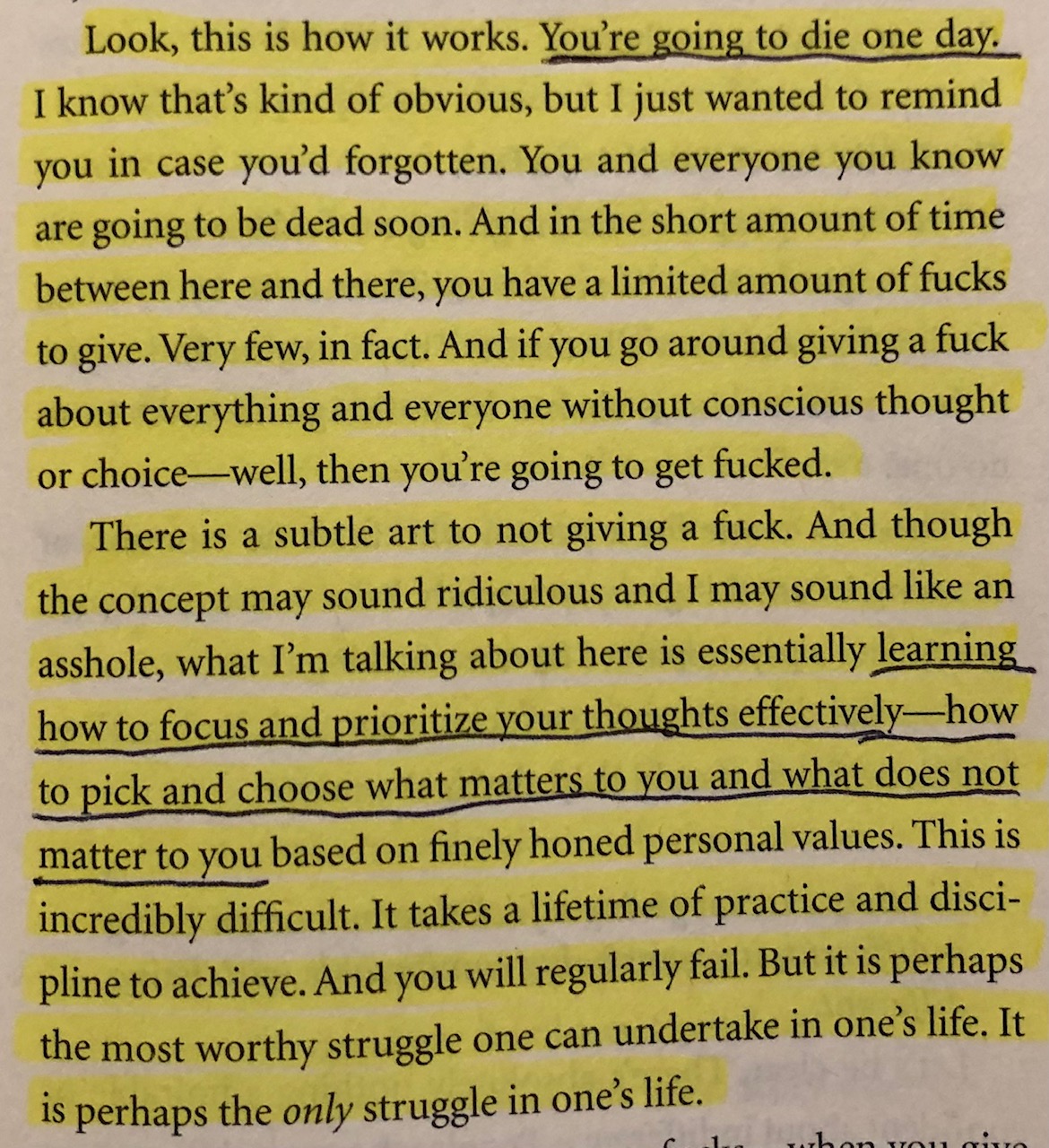
Subtleties of Not Giving a Fuck
- Not giving a fuck does not mean being indifferent, it means being comfortable with being different.
- Don’t just be OK with everything and be a push over.
- Not giving a fuck doesn’t mean to just be OK with everything that happens. It means giving a fuck about certain things and standing up for them, even if it means pissing some people off, failing, embarrassing yourself, etc.
- You don’t say ‘fuck it’ to everything in life, but rather to everything unimportant in life.
- Quote (P. 17): “You can’t be an important and life-changing presence for some people without also being a joke and an embarrassment to others.”
- You simply can’t please everyone! Be yourself! Stand up for what you believe. Do and say the things you want to do and say. Be the way you want to be.
- To not give a fuck about adversity, you must first give a fuck about something more important than adversity.
- If little stuff is bothering you, chances are you don’t have enough important things going on in your life.
- Fixing this is the first thing you should address.
- If little stuff is bothering you, chances are you don’t have enough important things going on in your life.
- Whether you realize it or not, you are always choosing what to give a fuck about.
- When we are very young, we give a fuck about everything and everyone. As we get older, we mature and begin to accept things and ourselves, and reduce the number of fucks we give.
- Our fucks are often limited to our family, friends, and maybe a few other things.
- When we are very young, we give a fuck about everything and everyone. As we get older, we mature and begin to accept things and ourselves, and reduce the number of fucks we give.
- Quote (P. 20): “I believe that today we’re facing a psychological epidemic, one in which people no longer realize it’s OK for things to suck sometimes.”
- It’s OK for things to suck sometimes.
- When we don’t accept things and don’t accept that it’s OK for things to suck sometimes, we start to blame and judge ourselves.
- When you blame and judge yourself, you feel something is wrong with you, which drives you to overcompensate by buying shoes, drinking, etc.
Ch. 2: Happiness is a Problem
- 2,500 years ago, the Buddha was a young prince who grew up in a kingdom where his father didn’t expose him to ANY suffering. As he got older, he became exposed to the world’s suffering and decided to join society and suffer alongside the people. He later realized that this sucked and came to a few realizations that became the core of his philosophy and teachings:
- Life itself is a form of suffering. Everybody suffers.
- The rich suffer because of their riches. The poor suffer because of their poverty.
- Pain and loss are inevitable and we should let go of trying to resist them.
- Life itself is a form of suffering. Everybody suffers.
- Happiness is not something that can be ‘achieved’ by gaining things or building a certain lifestyle. It’s a state of being and acceptance of what is.
- Pain is, ultimately, a good thing. It’s what has allowed our species to evolve.
- Pain is nature’s preferred agent for inspiring change.
- It’s the mildly dissatisfied and insecure creature that’s going to do the most work to grow, innovate, and survive.
- Pain is not necessarily always bad or undesirable.
- This is why you shouldn’t shield yourself from pain or failure.
- Problems are a constant in life. They don’t stop — they get exchanged or upgraded.
- Ex. When you solve your health problem by buying a gym membership, you create problems like having to get up early to work out, sweating on the elliptical, and showering at the gym before going to work.
- Happiness comes from solving problems. The secret is in the solving of the problems, not in not having problems in the first place.
- Quote (P. 32): “Whatever your problems are, the concept is the same: solve problems, be happy.”
- Emotions are a feedback mechanism designed to steer you in the direction of beneficial change.
- Quote (P. 34): “If you feel crappy, it’s because your brain is telling you there’s a problem that’s unaddressed or unresolved. In other words, negative emotions are a call to action.When you feel them, it’s because you’re supposed to do something. Positive emotions are rewards for taking the proper action.”
- Emotions are only part of the equation, not the entire equation.
- Just because something feels bad doesn’t mean it is bad.
- Just because something feels good doesn’t mean it’s good.
- A key question to ask yourself in life is: What pain do you want in your life? What are you willing to struggle for?
- Happiness requires struggle.
- Quote (P. 37): “Whether you suffer from anxiety, loneliness, or whatever, the solution lies in the acceptance and active engagement of the negative experience — not the avoidance of it.”
- You have to attack your weaknesses and insecurities. Avoiding them isn’t the answer.
- Once you determine what you want in life, you have to be willing to participate in and endure the pain that comes with achieving it.
- Quote (P. 37): “Most people want to have great sex and an awesome relationship, but not everyone is willing to go through the tough conversations, the awkward silences, the hurt feelings, and the emotional psychodrama to get there.”
- You have to be willing to enjoy the process and pain that comes with going for what you want.
- Ex. The gym. You don’t get a great body unless you’re willing to endure the pain of the gym and eating right.
- Ex. Success at work. If you want to rise to the top of your place of work, you have to be willing to put in more hours than expected and more work than expected. If you’re willing to endure that pain, you’ll get there.
- You can’t be someone that wants the reward but hates the process. You have to learn to enjoy the daily grind.
- Daily habits that help you grow — you have to learn to enjoy doing them every day.
- We are defined by what we’re willing to struggle for.
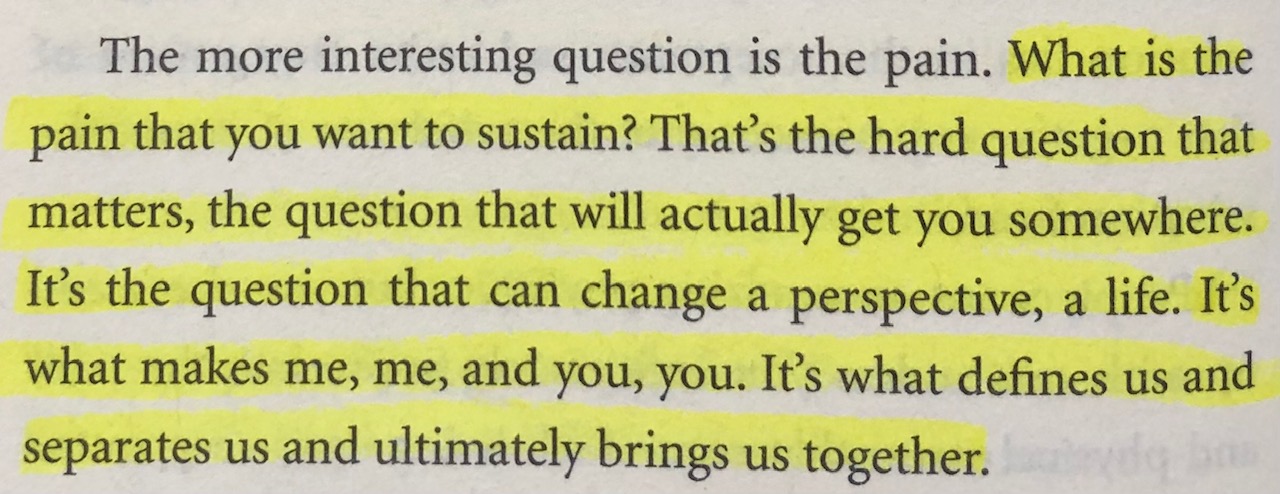
Ch. 3: You Are Not Special
- Quote (P. 47): “People with high self-worth are able to look at negative parts of their character honestly and then act to improve upon them.”
- As opposed to being delusional and lacking self-awareness by thinking you’re amazing at everything, like many people do.
- Today’s media and mass marketing efforts only show the most extreme ends of the bell curve because that’s what makes news.
- So only the greatest of the great is shown. Only the worst of the worst is shown.
- The problem is that these extremes mess up people’s expectations for themselves. It doesn’t reflect reality.
- Quote (P. 59): “The inundation of the exceptional makes people feel worse about themselves, makes them feel that they need to be more extreme, more radical, and more self-assured to get noticed or even matter.”
- To become great at anything, you have to dedicate a ton of time and energy toward it.
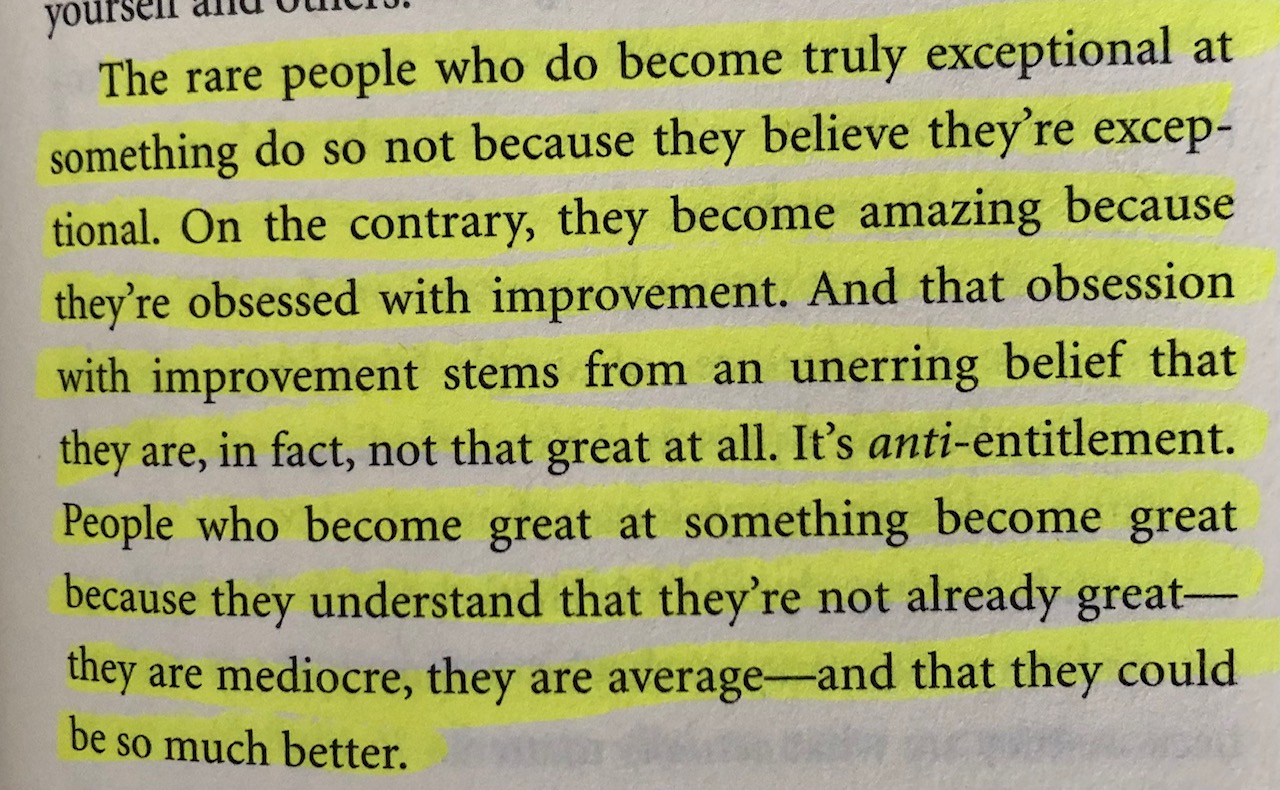
Ch. 4: The Value of Suffering
- Japanese General Hiroo Onoda fought in WWII and didn’t stop fighting even after the U.S. took out Japan with bombs at Hiroshima and Nagasaki.
- For 20+ years after the war, he and his troops hid in the jungles of Lubang in the Philippines, refusing to believe the war was over despite attempts from the U.S. and Philippine governments to tell them it was over.
- He was later found in the jungle and returned to Japan in 1974. He became a celebrity.
- He hated what he saw when he returned to Japan. He didn’t like what the country had become. This made him far more depressed than he ever was in the jungle because, at least in the jungle, he was fighting for something he believed in. When he returned and realized his sacrifice was for nothing, it killed him inside. He moved to Brazil.
- How you feel about your life, in many ways, depends on the metrics you use to compare yourself to others. Your expectations.
- Ex. Dave Mustain — Created the band ‘Megadeth’ after being kicked out of Metallica in the early years of both bands. Megadeth went on to become hugely successful, but fell well short of Metallica’s success. Dave considered himself a failure despite having huge success with his band. He valued his success by using Metallica as a reference point. Compared to most other bands and people, though, he was very successful.
- Dave only considered himself a failure because he was comparing himself to Metallica. If he had compared himself and his success to the average person, he would have been happy.
- Ex. Dave Mustain — Created the band ‘Megadeth’ after being kicked out of Metallica in the early years of both bands. Megadeth went on to become hugely successful, but fell well short of Metallica’s success. Dave considered himself a failure despite having huge success with his band. He valued his success by using Metallica as a reference point. Compared to most other bands and people, though, he was very successful.
- There’s value in suffering — some of the best moments of your life are when you suffer and accomplish.
- Don’t pursue pleasure. Pleasure is a byproduct of living the right way with sound values.
- Good Values Are:
- Reality-Based
- Socially Constructive
- Immediate and Controllable
- Good values are achieved internally.
- Ex. Honesty, creativity, self-respect, standing up for yourself and others, charity, curiosity, humility.
- Bad Values Are:
- Superstitious
- Socially Destructive
- Not Immediate and Controllable
- Bad values are reliant on external events.
- Ex. Violence, being the center of attention, always being right, being liked by everyone.
- Quote (P. 86): “As a rule, people who are terrified of what others think about them are actually terrified of all the shitty things they think about themselves being reflected back at them.”
- Wow
- As this quote suggests, and as was discussed at length in The Four Agreements, not caring what others think about you (or not giving a fuck) comes down to self-love. When you love yourself completely, you aren’t bothered by the opinions of others. You’re free to be how you want to be, do what you want to do, and say what you want to say. When you don’t love yourself, you’re worried that others are going to spot the things you’re insecure about and won’t accept you because of it. So, you try to please everyone and do what it takes to be liked by everyone, even if it goes against your values.
- Values are about prioritization. What do you value most?
- Values are critical because the ones you prioritize highest and care the most about drive your decision-making, behavior, and happiness.
- When many of your values are ‘bad values’ that are reliant on external people and factors, you tend to give too many fucks about things that aren’t important.
- The key is to prioritize your values correctly and have ‘good values’ at the top. Direct your fucks to good values that will bring about the most happiness and improvement.
- Essentially, stop giving a fuck about things that aren’t important.
- Ex. Being liked and caring what others think. This shit is not important. Direct your fucks towards good values that are important and meaningful, like loving yourself, loving others, self-respect, family, etc.
Ch. 5: You Are Always Choosing
- Quote (P. 94): “We don’t always control what happens to us. But we always control HOW we interpret what happens to us, as well as HOW we respond.”
- Whether we like it or not, we are always taking an active role in what’s occurring to and within us.
- Take 100% responsibility for what happens in your life.
- Poker is a good analogy for taking responsibility for the choices you make in your life.
- In poker, your long-term success is determined by the choices you make with the hands you are dealt. The same is true in life.
- Quote (P. 109): “People who consistently make the best choices in the situations they’re given are the ones who eventually come out ahead in poker, and in life.”
- Regardless of the situation you’re faced with, you have the power to control your attitude, response, and choices.
- You are responsible for how you feel.
- Quote (P. 113): “You are already choosing, in every moment of every day, what to give a fuck about, so it is as simple as choosing to give a fuck about something else.”
- CHOOSE what to care about. Other people’s opinions, for example, should not even be on the radar.
- You are responsible for what you CHOOSE to give a fuck about.
Ch. 6: You're Wrong About Everything
- Personal growth can be approached scientifically.
- Our Values = Hypothesis
- Our Actions = Experiments
- Our Emotions = Data
- Based on your results and the way you feel, you can make adjustments along the way.
- There is no ‘right’ way to live. Every individual is different and will have their own unique values based on the things they care most about. This is what makes each of us unique — we don’t all give a shit about the same things
- Certainty is the enemy of growth.
- Human nature craves certainty and comfort. It’s easier to sit idle in certainty than get out there and pursue something great that comes with uncertainty.
- It’s more comfortable to sit in certainty. By choosing comfort (a short-term perk), you miss out on long term success and happiness.
- Ex. Guy who is single, lonely, and wants a partner never gets out of the house to do something about it. He’d rather sit in the certainty of where he’s at than get out there and face the uncertainty that comes with dating. He’s choosing the short-term comfort of staying sheltered over the long-term benefits of finding a partner/starting a family.
- We make too many assumptions. The fact is, we’re rarely right about anything.
- You have to really learn to question your assumptions. Whether you’re assuming somebody is thinking a certain thing, or whether you’re assuming an upcoming event is going to be a disaster.
- Often, the experiences we perceive at the time to be negative are actually the ones that help us learn and grow the most.
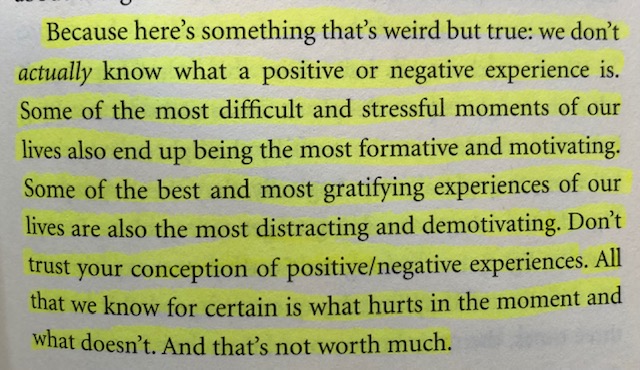
- Our mind is a ‘meaning’ machine.
- The mind constantly tries to understand our situation or environment better by making connections and assumptions.
- The problem is that the mind is a jumble of inaccuracies. The mind is usually wrong.
- The mind constantly tries to understand our situation or environment better by making connections and assumptions.
- Quote (P. 129): “Uncertainty is the root of all progress and growth.”
- Learn to be ‘uncertain.’ By being uncertain, you open yourself up to learning and growing. Be curious.
- Question some of the ‘certain’ beliefs or assumptions your mind tries to convince you of.
- The fact is, your mind is usually wrong.
- Quote (P. 137): “It is the mark of an educated mind to be able to entertain a thought without accepting it.” — Aristotle
Ch. 7: Failure is the Way Forward
- Failure is relative. Ultimately, it’s a good thing — it brings you closer to success.
- What you learn through failure is extremely valuable. It’s a teaching lesson.
- Quote (P. 144): “Improvement at anything is based on thousands of tiny failures, and the magnitude of your successes is based on how many times you’ve failed at something.”
- If somebody is better than you at something, it’s likely because they’ve practiced it more and have failed at it more.
- Ex. Public speaking
- Most of us are afraid to fail. We avoid failure at all costs.
- Quote (P. 145): “We can be truly successful only at something we’re willing to fail at. If we’re unwilling to fail, then we’re unwilling to succeed.”
- You have to be willing to fail, and you have to keep failure in perspective.
- Ultimately, failure is a good thing. It’s a stepping stone to success.
- Fear of failure is often due to poor values.
- Ex. If one of my values or goals is to make everyone like me, I will be anxious because failure is 100% defined by the actions of others, not by my own actions. I’m not in control and, therefore, my self-worth is going to be at the mercy of other people’s opinions of me.
- Pain and failure is part of the process of becoming great and successful. Don’t avoid it.
- Some of our proudest achievements have come when we’ve faced tremendous adversity.
- Adversity, struggle, pain, and failure ultimately BUILD you.
- Sometimes it takes serious adversity to take an objective and clear look at yourself and what you need to change to improve.
- VCR Question — These are tasks and questions that seem difficult to people who are contemplating them, but are extremely clear and easy to answer for those on the outside.
- These are situations where your mind runs wild and you overthink EVERYTHING.
- From the inside, the questions feel very complex because your mind is overthinking it.
- Ex. Wanting to drop out of med school but scared to tell your parents. The paperwork to leave med school is very straightforward — breaking your parents’ heart is not.
- Ex. Asking a girl out. Asking the question is straightforward — risking embarrassment and rejection feels much more complicated.
- The key is to just shut up and do it. Stop overthinking it.
- As discussed earlier, you really don’t know anything. Your mind is assuming things irrationally and inaccurately. So just do it.
- The ‘Do Something’ Principle — Action isn’t just the effect of motivation; it’s also the cause of it.
- If you’re stuck on a problem, don’t sit there and think about it; just start working on it. Even if you don’t know what you’re doing, the simple act of working on it will eventually cause the right ideas to show up in your head.
- Don’t just sit there. Do something. The answers will follow.
- By just getting started and taking action, you can motivate yourself.
- The worst thing you can do is procrastinate. Just get started. Get moving. Start working on it, and you will fuel your motivation, which will spark more action.
- This has been true in my life. When I have to work on a project I don’t want to work on, I try to just knock out the easiest part of the project first to get me going. From there, it’s easy to continue.
- Also, look at a project in small pieces rather than the whole thing. Chip away at the project by getting some small part of the project done each day.
- A good analogy is writing a book. Don’t think of writing the whole book — think of just knocking out one page per day.
- Also, look at a project in small pieces rather than the whole thing. Chip away at the project by getting some small part of the project done each day.
- If you’re stuck on a problem, don’t sit there and think about it; just start working on it. Even if you don’t know what you’re doing, the simple act of working on it will eventually cause the right ideas to show up in your head.
Ch. 8: The Importance of Saying 'No'
- Sometimes you have to reject things, and people, to have direction in your life.
- You can’t say ‘yes’ to everything. You just can’t. You have to be selective.
- We are defined by what we choose to reject.
- Trust and honesty are critical ingredients in any relationship.
- You shouldn’t just agree and say ‘yes’ to everything when it comes to a relationship. There needs to be honesty. If she asks you if her boots are cool and you don’t think they are, say so in a polite way. Don’t just agree purely to make her feel good. In the same way, be willing to receive honest feedback from her.
- A relationship will fall apart when you try to make each other feel good all the time. Without conflict, there can be no trust.
- Without trust, the relationship is literally meaningless. THERE HAS TO BE TRUST. So always be honest.
- Nobody trusts a yes-man.
- If trust is lost in the relationship, it’s over unless you both work to rebuild it.
- Be honest with people. Tell them the truth. Give them your thoughts.
- People may not always like it, but they respect it.
- Quote (P. 177): “For a relationship to be healthy, both people must be willing and able to both say ‘no’ and hear ‘no.’
- Conflict is necessary for a healthy relationship.
- Trust in a relationship can only be rebuilt by following a two-step process:
- The trust-breaker confesses to the true values that they chose over their relationship with you.
- Because the only reason someone would hurt you is if they valued something else (money, sex, etc.) over their relationship with you.
- The trust-breaker builds a solid track record of improved behavior over time.
- The Paradox of Choice — Ultimately, less is more.
- When faced with a large number of options, we have a hard time choosing, and when we do choose, we second guess our selection.
- We are less satisfied with our choice when selecting among a large number of options.
- Therefore, commit to a small number of things, but commit to them deeply.
- Commit to honing one or two crafts. Invest a lot time in developing and mastering those skills.
- Commit to one partner. Invest all of your time and energy into that person.
- Commit to one job. Invest your time and energy into becoming the best you can be at that job.
- Commit to a small group of friends. Invest your time and energy into them.
- Commitment to just a few things and people requires rejecting many other things and people, but it’s where the gold is buried.
- Quote (P. 183): “Commitment allows you to focus intently on a few highly important goals and achieve a greater degree of success than you otherwise would.”
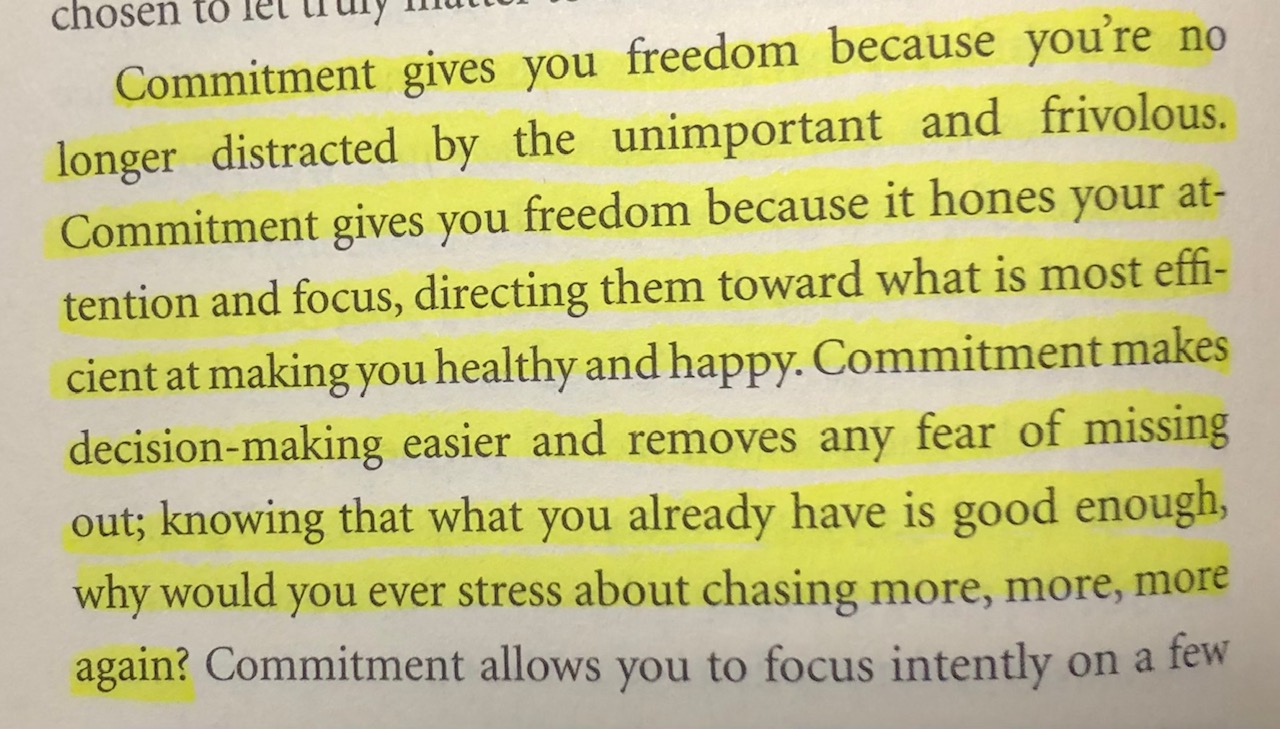
Ch. 9: And Then You Die
- Don’t fear death, acknowledge it and embrace it. The fact is, life can be gone in an instant.
- The Stoics of Ancient Greece and Rome used to encourage people to keep death on their mind always.
- When you know that life can be taken from you at literally any moment — and you have this at the front of your mind — you live with far more appreciation for your life and the people in it.
- Insignificant things that shouldn’t bother you — like the opinions of other people — won’t bother you because you recognize how fragile life is.
- You recognize the bigger picture of life.
- Fear is dissolved. You are no longer afraid or anxious of things that really shouldn’t phase you at all.
- Try to live with this realization at the front of your mind at all times.
- When you know that life can be taken from you at literally any moment — and you have this at the front of your mind — you live with far more appreciation for your life and the people in it.
- Quote (P. 199): “Confronting the reality of our own mortality is important because it obliterates all the crappy, fragile, superficial values in life.”
- If you don’t live with the perspective that death is around every corner, small superficial things will seem important when they really shouldn’t.
- Care about something greater than yourself. Contribute to something bigger than you.
- What is your legacy?
- How will the world be different or better when you’re gone?
- What mark will you have made?
- These are important questions to ponder.
- Pursuing something greater than yourself — and helping others — generates happiness.
- Quote (P. 202): “Bukowski once wrote, ‘We’re all going to die, all of us. What a circus! That alone should make us love each other, but it doesn’t. We are terrorized and flattened by life’s trivialities; we are eaten up by nothing.”
- Love people. Know that death is possible at any moment and don’t allow little things to get you down.
- Quote (P. 202): “And the primary lesson was this: There is nothing to be afraid of. Ever. And reminding myself of my own death repeatedly over the years is the only thing that has helped me hold this realization front and center in my mind. This acceptance of my death, this understanding of my own fragility, has made everything easier — untangling my addictions, identifying and confronting my own entitlement, accepting responsibility for my own problems, suffering through my fears and uncertainties, accepting my failures and embracing rejections — it has all been made lighter by the thought of my own death.”

